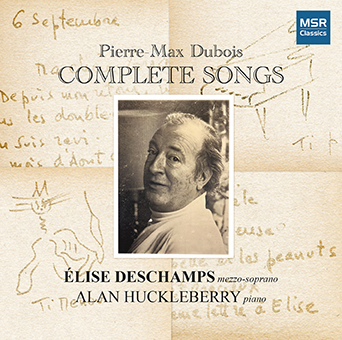
PIERRE-MAX DUBOIS: COMPLETE SONGS
Pierre-Max Dubois
ÉLISE DESCHAMPS, mezzo-soprano
Alan Huckleberry, piano
World Premiere Recordings
[MS1817]
$14.95
PROGRAM NOTES
In 1963, Pierre Max Dubois (or PIMADU, as he often signed his personal notes and letters) composed Six Songs – for voice and piano or voice and small orchestra – for French baryton-martin singer Camille Maurane (1911-2010), who was well-known for his interpretations of Debussy’s Pélléas et Mélisande and for creating numerous roles at the Opéra-Comique in Paris. The songs, based on the poems of Dadaist writer Philippe Soupault (1897-1990), were chosen from diverse poetry sets: Chansons (1921-1937), Chansons du jour et de la nuit written (1947) and Chansons vécues (1948-1949). Soupault, inspired by Apolinaire, wrote chansons instead of poems that he sang as he was writing them. For this reason, he would refuse to use any punctuation, which Dubois obliged. Dubois, like a cartoonist, creates a theatrical panorama of six unusual personalities. Dubois composed twelve songs in 1962 based upon Belgian writer José Bruyr (1889-1980); one for each sign of the Zodiac. In the set, each song describes the precise traits of each celestial sign, and each song has its own unique voice and mood. Dubois illustrates varied movements with brilliance and clarity in his own designed Tone-Zodiac. The Zodiac was dedicated to Claudia Barreau, a former professor at the Geneva Conservatory of Music in Switzerland and at the Ferney Conservatory in France.
In 1962, Dubois was inspired by anonymous poetry from the 18th century to write the three songs heard in this collection. Ba be bi bo bu was originally written for soprano and piano or harpsichord, Ne dérangez pas tout le monde and V’la c’que c’est qu’d’aller au bois for tenor or soprano, and piano or harpsichord. Dedicated to Michel Sénéchal (1927-2018), a French tenor, these secular songs are playful ballades, which are reminiscent of the time of the minstrels and troubadours.
From a collection of seventy poems composed in 1950 by French writer and poet Maurice Fombeure (1906-1981), Dubois used only five poems and composed his Étoiles brûlées (Mischievous Stars) in 1959 adding shining echoes of old-time French songs to the vocal library. The last song is from the second part of the Étoiles brûlées called Sous l’étoile de la licorne (Under the Unicorn Star) and the other four songs are from the first part named J’apprivoise par jeu (I Learn Through Play). Again, Dubois dedicated these songs to Sénéchal.
Five Sung Poems for bass and piano dates from 1969 and bears a dedication to Roger Soyer (b.1939), a French operatic bass-baritone, predominantly associated with French repertory and Mozart. The poetry is from Jean Tardieu (1903-1995). Le Môme néant and Les Erreurs are from a first set of poems called Monsieur Monsieur (1948-1950), Rengaine à pleurer and Rengaine pour piano mécanique come from a 1951 publication of the same title with an added subtitle Chansons avec ou sans musique, and Contre-point-du-jour is from Une voix sans personne (1951-1953). Dubois’ last song cycle offers five main characters with contrasting stories and declamatory speech that range from a cappella, monophonic, unison and spoken dialogue, to plaintive and illogical.
PROGRAM
PIERRE-MAX DUBOIS (1930-1995)SIX CHANSONS (1963) | Poems by Phillippe Soupault
I. Chanson du rémouleur
II. La Galette
III. Imitation des fleurs
IV. Pour les mauvais jours
V. Doit et avoir
VI. Monsieur Pépinet
LE ZODIAQUE (1962) | Poems by José Bruyr
I. Le Capricorne
II. Le Lion
III. La Balance
IV. Le Vierge
V. Les Poissons
VI. Le Verseau
VII. Le Scorpion
VIII. Le Bélier
IX. Le Centaure
X. Les Gémeaux
XII. L’Écrevisse
XIII. Le Taureau
TROIS CHANSONS (1962) | Anonymous poetry from the 18th century
I. Ba Be Bi Bo Bu
II. Ne dérangez pas tout le monde
III. V’la c’que c’est qu’d’aller au bois
ÉTOILES BRÛLÉES (1959) | Poems by Maurice Fombeure
I. Voyage en tortillard
II. Chanson de la rose
III. Poussivité
IV. “Vieilles chansons”
V. Variations pour une trompette de cavalerie
CINQ POÈMES CHANTÉS (1969) | Poems by Jean Tardieu
I. Rengaine à pleurer
II. Rengaine pour piano méchanique
III. Les Erreurs
IV. Contre-point-du-jour
V. La môme néant
MSR Classics
